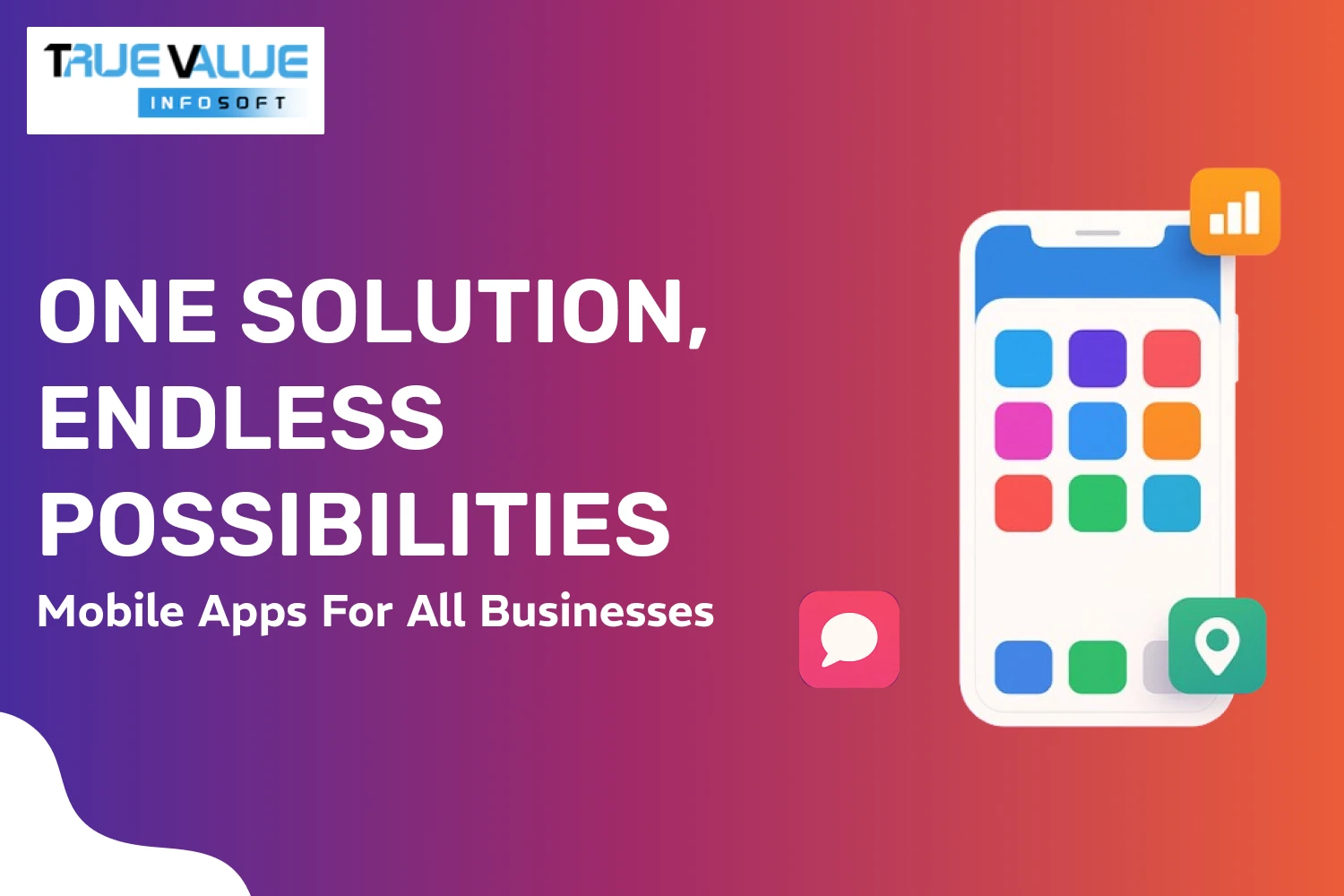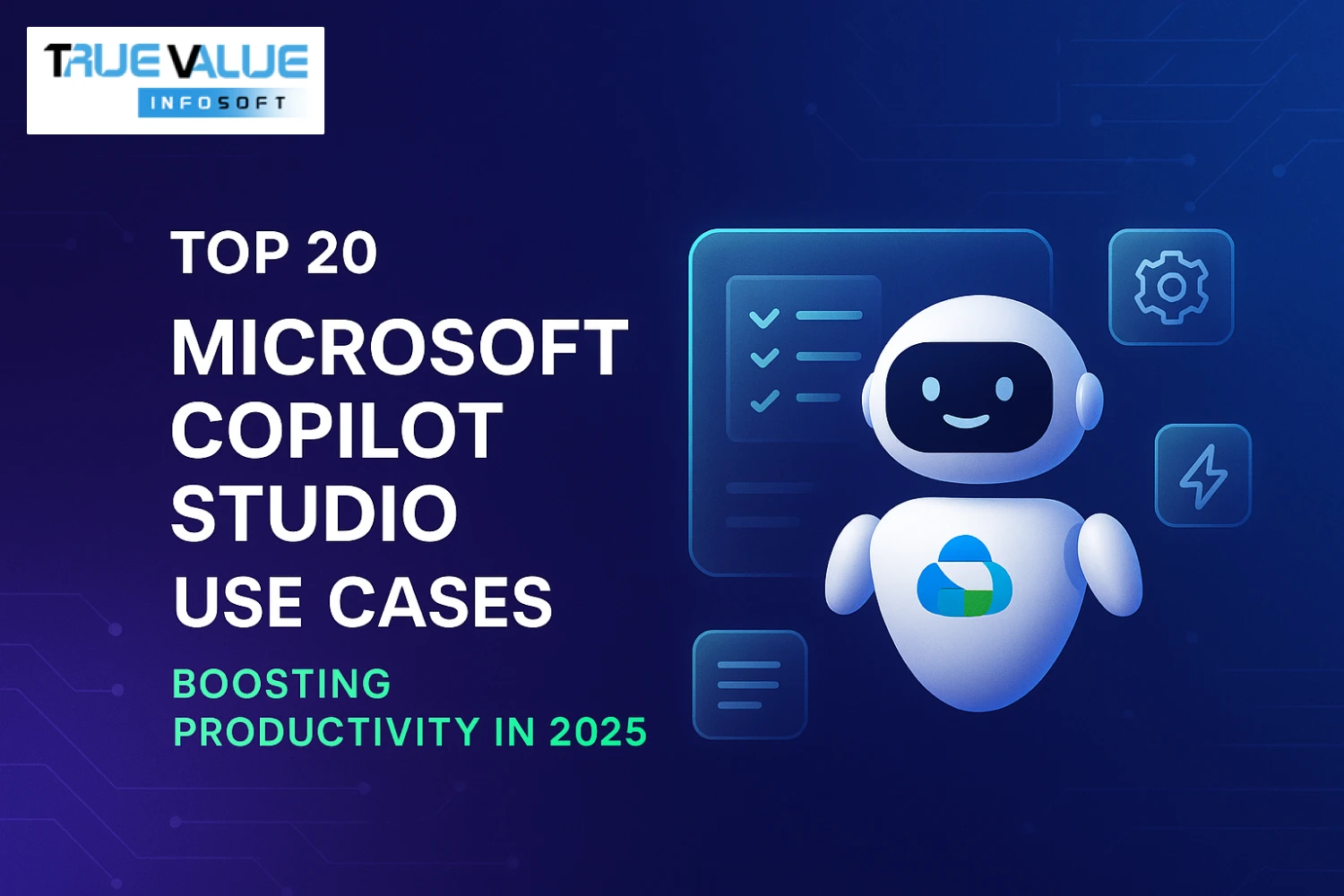Introduction
Have you ever wondered how some businesses effortlessly connect with millions of customers worldwide while others struggle to keep up? The secret often lies in leveraging the power of mobile apps—an essential tool for modern businesses looking to thrive in a competitive digital landscape. Whether you run a startup, a growing SME, or an established enterprise, having a custom mobile app can transform the way you engage customers, streamline operations, and boost revenue.
At True Value Infosoft, a top app development company in India, we understand that every business is unique. That’s why we craft tailored mobile solutions that fit your specific needs and goals. With our expertise and innovative approach, we empower businesses to unlock endless possibilities through mobile technology. In this blog, we’ll explore how one solution—mobile apps—can revolutionize all types of businesses across industries.
Welcome to the age of one solution with endless possibilities — mobile apps for all businesses.
Why Mobile Apps are Essential for Modern Businesses
- Enhanced Customer Engagement: Mobile apps offer direct communication channels between businesses and their customers. Features like push notifications, in-app messaging, and personalized offers help build strong, long-lasting relationships.
- Improved Accessibility: Apps allow customers to interact with businesses anytime and anywhere. This constant availability increases customer satisfaction and retention.
- Increased Sales and Revenue: Businesses can boost their sales through in-app purchases, mobile marketing, and e-commerce integrations. Mobile apps streamline the buying process, making it more convenient for customers to make purchases.
- Brand Recognition and Loyalty: A well-designed mobile app strengthens brand visibility. It becomes a constant presence on users' devices, reinforcing brand recognition and encouraging repeat business.
- Operational Efficiency: Apps aren't just for customers. Internal mobile apps improve team collaboration, automate workflows, and optimize daily operations, leading to cost savings and increased productivity.
Mobile App Categories by Business Type
1. Retail and E-commerce
- Customer-Facing Apps: Online stores, digital catalogs, real-time inventory.
- Admin Apps: Inventory management, order tracking, analytics dashboards.
2. Healthcare
- Patient Apps: Appointment booking, virtual consultations, health tracking.
- Doctor/Staff Apps: Scheduling, patient records, telemedicine.
3. Education
- Student Apps: eLearning platforms, quizzes, study material access.
- Teacher/Admin Apps: Attendance, grading, content sharing.
4. Finance and Banking
- Customer Apps: Mobile banking, expense tracking, investments.
- Internal Apps: Employee dashboards, approval systems, data visualization.
5. Logistics and Transportation
- Driver Apps: Route optimization, delivery updates, GPS tracking.
- Customer Apps: Parcel tracking, delivery status, payment integration.
6. Hospitality and Travel
- Guest Apps: Booking engines, itinerary planners, customer support.
- Staff Apps: Housekeeping management, guest check-in/check-out.
7. Real Estate
- Buyer/Renter Apps: Property listings, virtual tours, mortgage calculators.
- Agent Apps: Lead management, property updates, customer engagement.
8. Manufacturing
- Monitoring Apps: Machine status, workflow automation.
- Admin Apps: Inventory, maintenance scheduling.
9. Media and Entertainment
- Streaming Apps: Music, video, podcasts.
- Creator Apps: Content publishing, analytics, monetization.
Key Features of a Successful Business Mobile App
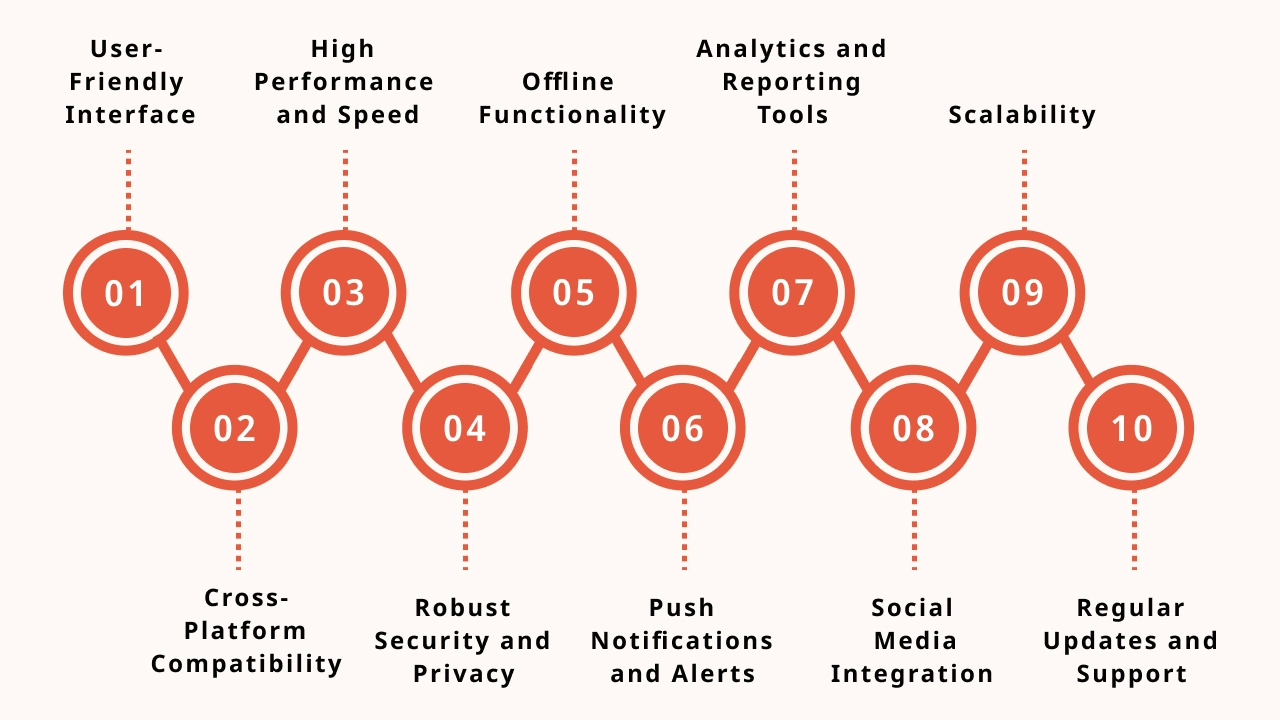
- User-Friendly Interface: A clean, intuitive design ensures users can navigate the app effortlessly, enhancing user satisfaction and retention.
- Cross-Platform Compatibility: Support for multiple platforms (iOS, Android) maximizes reach and accessibility to a broader audience.
- High Performance and Speed: Fast loading times and smooth functionality prevent user frustration and reduce app abandonment.
- Robust Security and Privacy: Data encryption, secure login, and compliance with privacy regulations protect sensitive user and business information.
- Offline Functionality: Allowing certain features to work without internet connectivity improves usability in low-network areas.
- Push Notifications and Alerts: Timely updates and personalized notifications keep users engaged and informed about offers, updates, or important messages.
- Analytics and Reporting Tools: Built-in analytics help businesses track user behavior, app performance, and areas for improvement.
- Social Media Integration: Seamless sharing and login via social platforms boost user engagement and broaden marketing reach.
- Scalability: An app that can grow with the business needs ensures long-term value without frequent complete redesigns.
- Regular Updates and Support: Continuous maintenance and feature upgrades keep the app relevant, secure, and bug-free.
The Mobile App Development Process
- Idea and Research: Define your app’s purpose, target audience, and goals. Conduct market research and competitor analysis to validate your idea.
- Wireframing and UI/UX Design: Create wireframes and mockups to visualize the app’s layout and user experience. Focus on intuitive navigation and appealing design.
- Choosing a Tech Stack: Decide on the platform (iOS, Android, or cross-platform) and select the appropriate programming languages and tools.
- Development (Frontend & Backend): Build the user interface (frontend) and the server-side logic (backend). Integrate APIs, databases, and necessary third-party services.
- Testing and Quality Assurance (QA): Perform rigorous testing, including functionality, usability, performance, and security tests, to ensure a smooth user experience.
- Deployment to App Stores: Prepare and submit your app to Google Play Store, Apple App Store, or other relevant platforms, complying with their guidelines.
- Post-Launch Support and Maintenance: Monitor app performance, fix bugs, release updates, and add new features based on user feedback and evolving business needs.
Trends Shaping the Future of Mobile Apps for Business
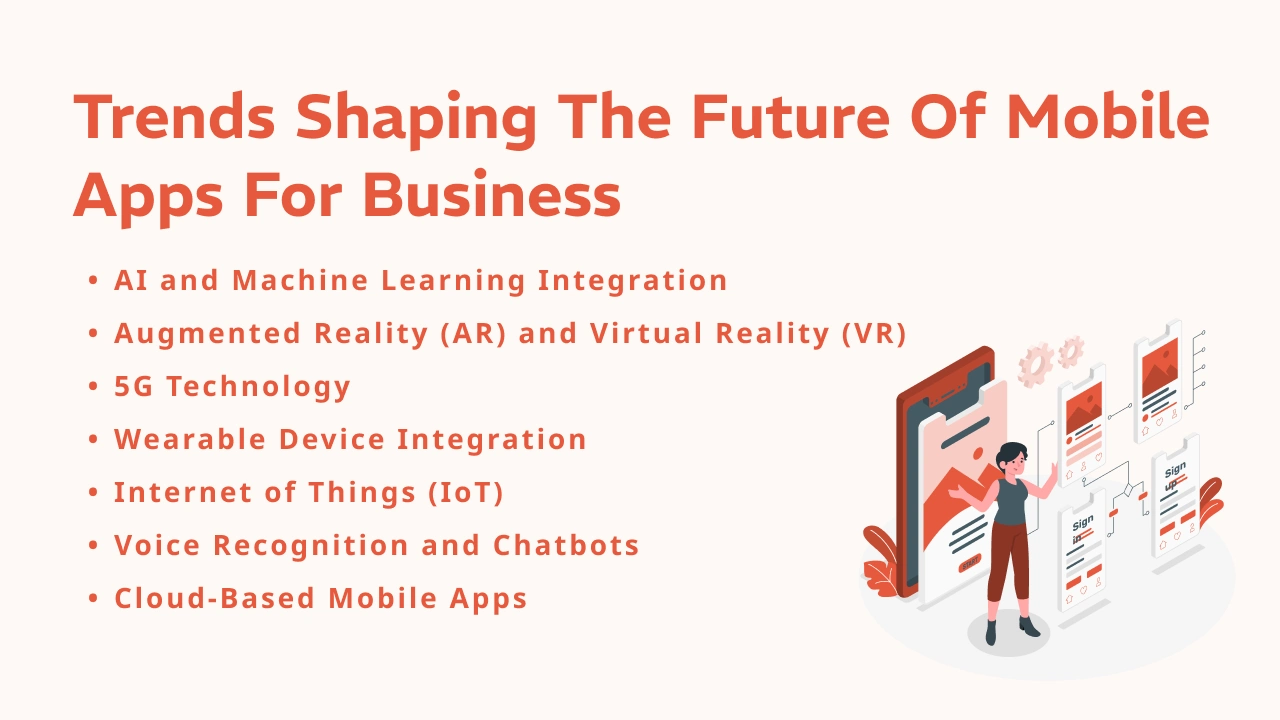
- AI and Machine Learning Integration: AI-powered apps deliver personalized experiences, automate customer service with chatbots, and analyze user behavior to optimize business strategies.
- Augmented Reality (AR) and Virtual Reality (VR): AR and VR technologies enhance customer engagement by providing immersive experiences, virtual try-ons, and interactive product demos.
- 5G Technology: The rollout of 5G enables faster app performance, seamless streaming, and improved connectivity, especially for data-intensive applications.
- Wearable Device Integration: Apps connected to wearables provide real-time health monitoring, fitness tracking, and instant notifications, enhancing customer engagement.
- Internet of Things (IoT): IoT-connected apps control smart devices, automate workflows, and gather valuable data to improve business operations and customer experiences.
- Voice Recognition and Chatbots: Voice-enabled commands and intelligent chatbots improve accessibility, streamline customer service, and reduce response times.
- Cloud-Based Mobile Apps: Cloud integration allows businesses to store and access data securely, enabling scalable and collaborative app experiences.
Industry-Specific Use Cases
- E-commerce: Personalized shopping experiences using AI recommendations.
- Healthcare: Real-time vitals monitoring via IoT.
- Education: Gamified learning modules for higher retention.
- Finance: AI-driven financial planning and fraud detection.
- Hospitality: Voice-enabled room service requests.
Case Studies: Businesses Transformed by Mobile Apps
- Domino’s Pizza
- Streamlined ordering through a simple app led to a massive increase in sales.
- Zomato
- Integrated reviews, ordering, and delivery in one place for massive user engagement.
- Airbnb
- Revolutionized travel accommodations via a user-friendly platform.
- Nike Training Club
- Engaged users with fitness routines, driving brand loyalty.
- Slack
- Made team collaboration seamless through mobile and desktop sync.
Common Challenges in Business Mobile App Development
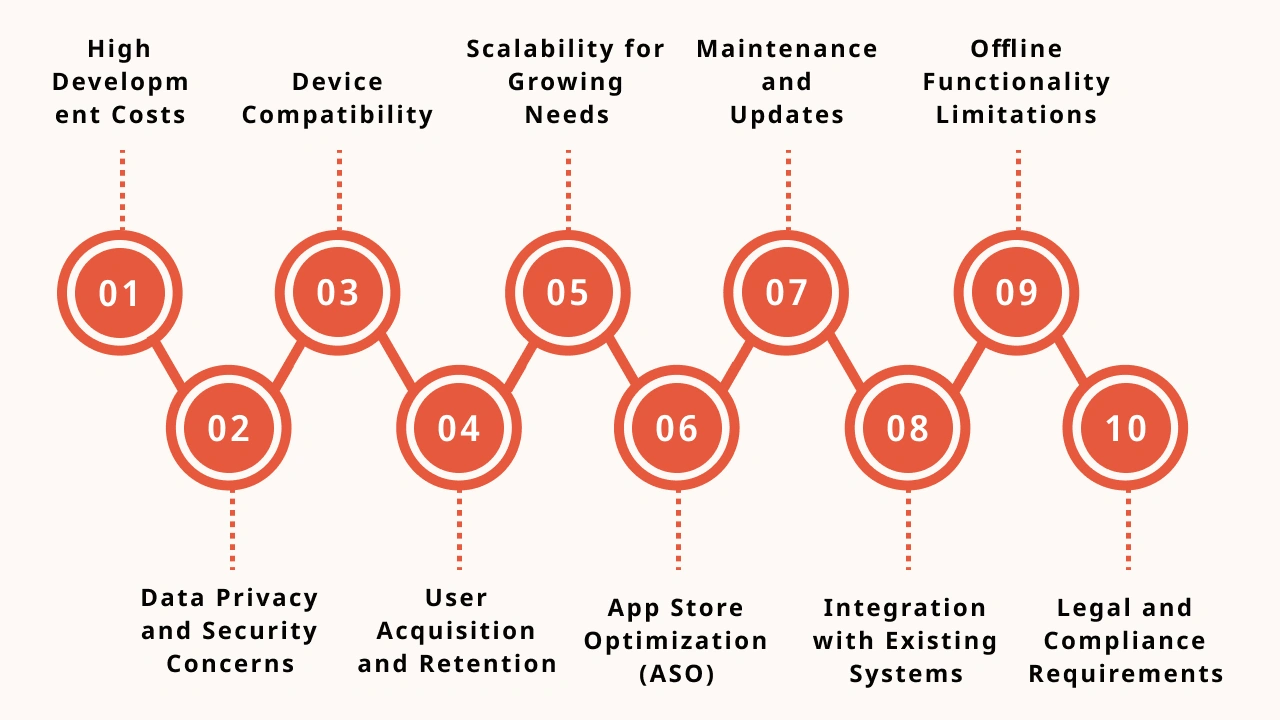
- High Development Costs: Building a quality mobile app can require significant investment in design, development, testing, and maintenance, which can be a barrier for small businesses.
- Data Privacy and Security Concerns: Protecting sensitive user and business data is critical. Compliance with regulations like GDPR adds complexity to app development.
- Device Compatibility: The wide variety of smartphones, operating systems (iOS, Android), and screen sizes makes it challenging to ensure consistent performance and user experience across all devices.
- User Acquisition and Retention: Attracting users to download and regularly use the app is difficult due to fierce competition and user expectations.
- Scalability for Growing Needs: Apps must be designed to handle increasing users and data volume as the business grows, requiring robust architecture.
- App Store Optimization (ASO): Getting visibility in crowded app stores needs strategic keyword use, reviews, and regular updates.
- Maintenance and Updates: Continuous bug fixes, feature upgrades, and adapting to OS changes are essential but resource-intensive.
- Integration with Existing Systems: Seamlessly connecting the app with backend databases, CRMs, or ERPs is often complex.
- Offline Functionality Limitations: Ensuring app usability without internet access is challenging but necessary for some users.
- Legal and Compliance Requirements: Navigating industry-specific regulations and legal standards demands careful attention during development.
How True Value Infosoft Empowers Businesses with Mobile Apps
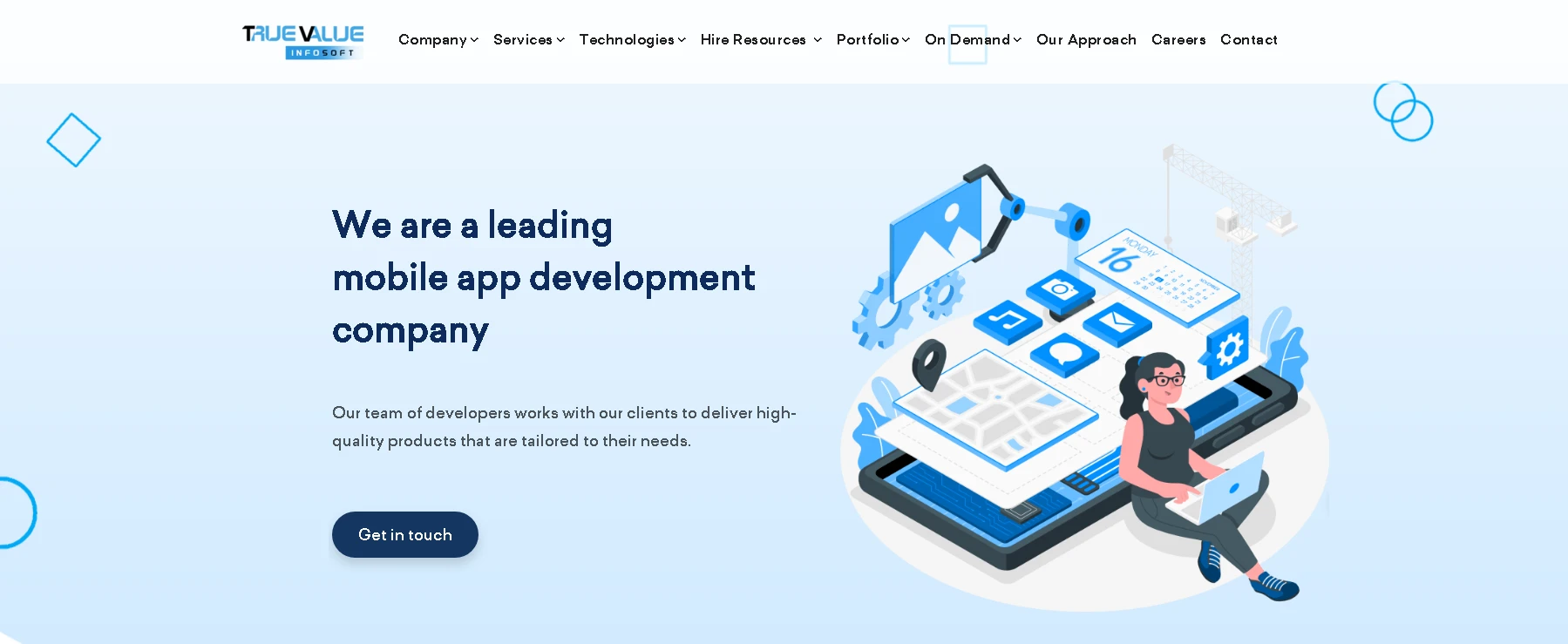
At True Value Infosoft, the best app development company in India, we believe in delivering digital excellence through innovation. We offer end-to-end mobile app development services that cater to every business sector. Whether you are a startup looking to enter the market or an enterprise scaling up, our custom solutions ensure your app drives results.
Our Strengths:
- Agile development methodology
- UI/UX expertise
- Experienced cross-platform developers
- Industry-specific app architecture
- Scalable and secure coding practices
- 24/7 support and maintenance
Why Choose True Value Infosoft?
- Proven Expertise: With years of experience in mobile app development, True Value Infosoft has successfully delivered projects across diverse industries, ensuring top-notch quality and innovation.
- Client-Centric Approach: We prioritize our clients’ unique business needs, offering tailored solutions that align perfectly with their goals and vision.
- Cutting-Edge Technology: Our team stays updated with the latest technologies and trends, incorporating AI, AR, IoT, and cloud solutions to build future-ready mobile apps.
- Skilled and Experienced Team: True Value Infosoft boasts a dedicated team of expert developers, designers, and project managers who ensure seamless app development and deployment.
- Agile Development Process: Our agile methodology promotes flexibility, transparency, and faster delivery, enabling clients to see continuous progress and participate actively.
- Cross-Platform Expertise: We develop high-performance native and hybrid apps compatible with Android, iOS, and other platforms, maximizing your market reach.
- Robust Security Measures: Security is our priority — we implement strong data protection protocols to safeguard your app and users’ information.
- Affordable Pricing: We offer competitive and transparent pricing models without compromising on quality.
- Post-Launch Support: Our relationship doesn’t end with deployment; we provide ongoing maintenance, updates, and support to keep your app running smoothly.
- Trusted Partner: Numerous satisfied clients globally trust True Value Infosoft for delivering reliable and scalable mobile app solutions.
Conclusion
From increasing customer engagement to streamlining operations and scaling businesses, mobile apps truly offer one solution with endless possibilities. Regardless of the industry, mobile apps empower businesses to stay competitive, innovative, and customer-focused.
As mobile technology continues to evolve, so will its potential. If you want to leverage mobile apps to transform your business, the time is now — and the partner you need is True Value Infosoft.
FAQs
All businesses can benefit, but e-commerce, healthcare, education, logistics, and hospitality see the highest ROI.
Costs vary based on complexity, features, and platform. Basic apps start around $5,000, while advanced solutions can exceed $100,000.
Typical development time ranges from 2 to 6 months.
Native apps are built for a specific platform, offering better performance. Hybrid apps work on multiple platforms with a single codebase.
Yes, we provide comprehensive post-launch support and maintenance packages.
